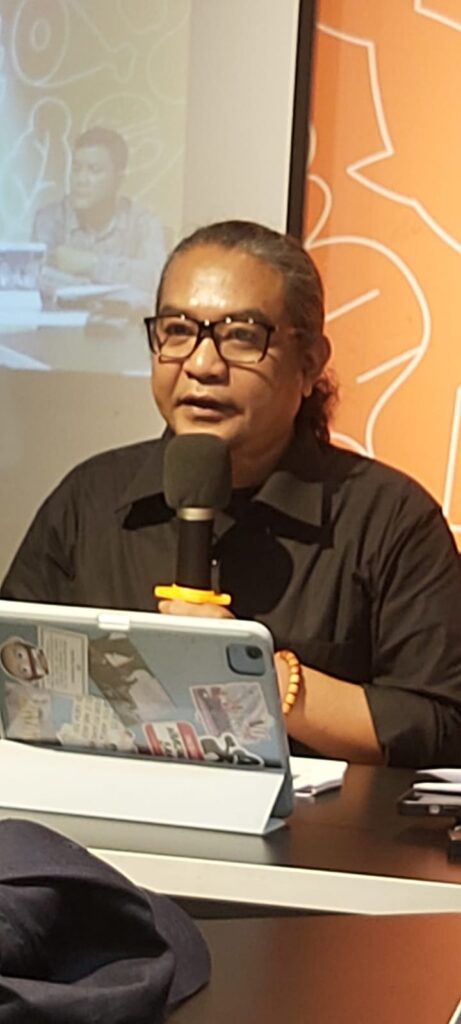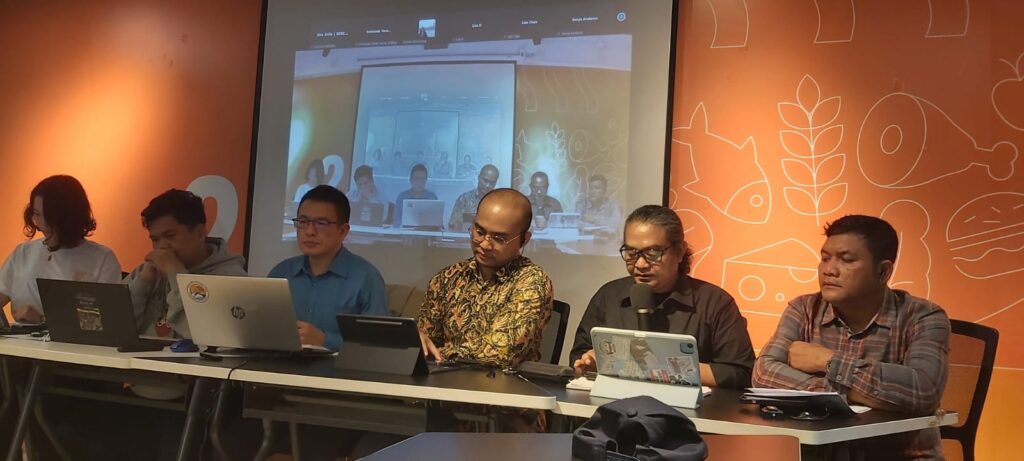[Taipei, 25 October 2024] – East and Southeast Asian civil society leaders committed to strengthening regional cooperation on human rights, democracy, and migration rights protection in Taipei, Taiwan (23-24 October). About 50 representatives of various civil society organisations and individual rights advocates from 14 countries working on human rights for migrants, refugees, stateless and undocumented people and workers gathered for a Cross-Regional Forum: Promoting Rights of People on the Move in East and Southeast Asia organised by BEBESEA (Better Engagement Between East and Southeast Asia).
The forum discussed the current situations and concerns of the people on the move, geopolitical dynamics and instability that cause more involuntary migration, and the rise of authoritarianism, and shrinking democratic spaces that all impact the promotion and protection of migrants’ rights in the region. In such a context, the civil society leaders participating in the forum reiterated the importance of regional cooperation and solidarity to the governments’ accountability in protecting democracy and human rights.
“We have chosen Taiwan to be our ideal location to hold this forum because of its geographical location connecting East and Southeast Asia and political environment that allows us to safely discuss some sensitive issues related to human rights and democracy in the region.” – Mariko Hayashi, Co-founder, BEBESEA
There are two regional momentums that the participants of the forum particularly responded to: 1) the recent adoption of the ASEAN Guidelines on the Placement and Protection of Migrant Fishers and 2) the development of the memorandum of understanding (MoU) on the protection of migrant fishers on board Taiwanese fishing vessels between Indonesia and Taiwanese authorities.
The Guidelines is the operational document to the ASEAN Declaration on the Placement and Protection of Migrant Fishers that recognizes migrant fishers as migrant workers, entitling the former to the same rights and protection of migrant workers. Both the Declaration and Guidelines note the application of Universal Declaration of Human Rights, fundamental labour conventions, and other relevant international instruments in the case of migrant fishers. The rights of migrant fishers and measures of protection that need to be put in place by ASEAN member states are specified in the ASEAN Guidelines.
The measures of protection specified in the ASEAN Guidelines are governed by the principles of (i) right based, (ii) non-discrimination, (iii) gender sensitive and gender responsive, (iv) inclusion and targeted support for migrant fishers including undocumented migrants and migrant in crisis, (v) transparency, integrity, and accountability, (vi) participation, representation, voice and agency of migrant fishers, (vii) whole of government and whole of society, (viii) shared responsibility, (ix) evidence-based policy and programmes, and (x) partnership and collaboration.
“The Declaration and Guideline can be the reference for relevant stakeholders, governments of receiving countries of fishers, including fishing vessels owners to improve the human rights protection, due to the members of ASEAN being the majority resource country of migrant fishers”. Daniel Awigra – Executive Director HRWG.
Migrant fishers play a central role in the growth of the fishing industry in Taiwan. According to the Fisheries Agency, Ministry of Agriculture, ‘Fishery Statistics Annual Report of the Republic of China (2023)’, in 2022, a total of 21,811 migrant fishers worked on distant water fishing (DWF) vessels, and 11,250 on board Taiwanese coastal water fishing fleets. Indonesia dominates this number, followed by the Philippines and Vietnam. The huge number of migrant fishers working in this sector enables Taiwan to hold a strategic position in the global fishing industry.
However, the ongoing decade of labor exploitation and human rights violation experienced by migrant fishers in the Taiwanese fishing industry both on the domestic and distant water fishing fleets are unacceptable, indicating serious omission of human rights violations as well as lack of true commitments and actions by Indonesian and Taiwanese authorities resolving the issues towards progressive solutions.
Therefore, the representatives of the Coalition on the Protection of Indonesian Migrant Fishers on Taiwanese Fishing Vessels (the Coalition) attended the BEBESEA’s Cross-Regional Forum demanding the Indonesian and Taiwanese authorities to intensify policy discussions leading to the development of MoU on the protection of Indonesian migrant fishers onboard Taiwanese fishing vessels.
It is important to emphasize that discussions leading to the development of MoU, particularly for the Taiwanese distant fishing, shall consider the Proposal and Union Demands that have been delivered and communicated constructively to both authorities last March. As main highlights, the Coalition demands the incorporation of fundamental labor rights and decent work, freedom of association and anti-retaliation, collective bargaining agreements, Wi-Fi, fair pay, grievance handling, and employer accountability for labor recruitment, including recruitment fees and related costs fully paid by employers to protect the migrant fishers.
“This arrangement must build on the international human rights and labour standards to make sure that the human rights of fishers are protected throughout their migration phase, including at sea“ Jeremia Humolong Prasetya – Program Manager, IOJI.
Lennon Ying-Da Wang, Director of the Department of Policies on Migrant Workers in Serve the People Association states: “All the shocking violations we encountered by migrant workers from all different sectors in Taiwan clearly show that forced labor is clearly a systematic condition. Take the fishing sector for example, we see salaries of distant water fishermen still largely paid through the brokers; there is still no regulation to ensure the access of WIFI for more than 20,000 distant water migrant fishermen. We call on the government of Taiwan to show their political willingness to start to change the series of systematic forced labor conditions and to work with all other stakeholders which include the unions and CSO/NGO for migrant workers, employers, brands and retailers (especially for the fishing industry), governments of migrant-sending countries and other concerned countries to work together with a timeline. We understand all the problems might not be fixed all at once, so all of us are dedicated to contributing our efforts to work on it, and so the government and other stakeholders shall take their parts, too.
Hariyanto Suwarno, Chairperson SBMI, as one of the Coalition’s representatives participating in the BEBESEA’s Cross-Regional Forum, added that in order to have meaningful, inclusive, and equal social dialogues as well as progressive, just, fair and effective agreement for protecting human rights of migrant fishers, the Indonesian and Taiwanese authorities need to immediately establish and facilitate regular tripartite meetings among officials, industries and unions in Indonesia and Taiwan. “Further delays on establishment of the arrangement for better labor protection of migrant fishers are serious omissions to human rights violations,” he concluded.

During the Cross-Regional Forum organized by BEBESEA, Hariyanto emphasized the importance of implementing Business and Human Rights (BHR) principles in the global fishing industry, particularly in the Indonesia-Taiwan context. Hariyanto highlighted that the UN Guiding Principles on Business and Human Rights are based on three main pillars:
- The state’s duty to protect human rights from abuses by third parties, including corporations, through strong regulations, policies, and judicial mechanisms.
- The corporate responsibility to respect human rights by ensuring that their operations do not lead to rights violations, mitigating any adverse impacts, and providing mechanisms for redress for affected workers.
- Access to effective remedies for victims of business-related human rights abuses, both through judicial and non-judicial means.
Hariyanto stressed that corporate responsibility to respect human rights should be reflected through a clear commitment to human rights policies, thorough human rights due diligence to detect and address negative impacts, and transparent performance reporting. These are standards that corporations in the international fishing industry must uphold.
Hariyanto also provided additional data of grievance in SBMI, further illustrating the trends and challenges faced by Indonesian Migrant Workers (PMI) documented over the past decade, covering total cases, gender breakdown, employment types, issues faced by Indonesian Migrant Workers (PMI), destination countries, and PMI origin provinces. From 2013 to 2023, a total of 5,464 cases were recorded, with the peak in 2021 (999 cases) and the lowest number in 2015 (148 cases). Case numbers fluctuated, yet saw a significant increase from 2019 onwards. By gender, cases involving women reached 51.8% (2,828 cases), while those involving men were 48.2% (2,636 cases), indicating a slightly higher number of cases involving women. By employment type, the largest number of cases involved Domestic Workers (2,415 cases), followed by Seafarers (747 cases), factory workers (641 cases), and construction workers (485 cases), with smaller numbers in agriculture, livestock, and other sectors.
Regarding types of issues, human trafficking was the most prominent, accounting for 34.7% or 1,896 cases, followed by unpaid wages at 17.7% or 968 cases. Other cases included failure to depart, unfair termination, and fatalities. Malaysia was the main destination country for PMI, representing 34.7% or 1,383 cases, followed by Saudi Arabia (1,116 cases) and Taiwan (603 cases), indicating some diversity in placements outside these primary countries. Meanwhile, most PMI originated from West Java (1,390 people), followed by Central Java (952 people) and East Java (731 people), with notable numbers also from West Nusa Tenggara and Banten.
He also referenced the findings from a joint report by SBMI and Greenpeace, Seabound: The Journey to Modern Slavery on the High Seas, which exposed forced labor practices and workers’ rights violations on fishing vessels, including those certified by the Marine Stewardship Council (MSC). These findings prompted the U.S. Customs and Border Protection (CBP) to issue a ban in 2021 on imports from certain vessels suspected of engaging in forced labor, such as the Hangton 112.
At the activity, Hariyanto urged companies in the global fishing sector to reinforce accountability and transparency in their business practices and ensure adequate protection for workers. To achieve comprehensive human rights protections, he emphasized the need for cooperation among governments, companies, labor unions, and civil society organizations through a tripartite dialogue involving stakeholders from both Indonesia and Taiwan.
- Rilis Bersama Telah Tayang di https://bebesea.org/category/article/page/3/?et_blog

